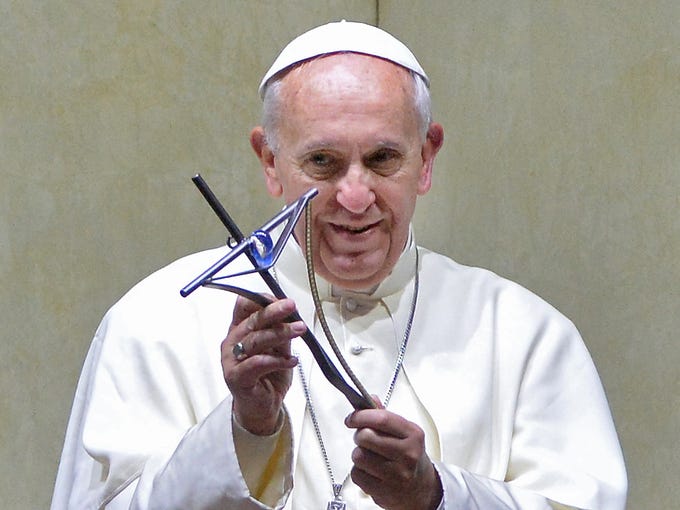The first Latin American pontiff has called on Catholics to adopt a more missionary mind-set.
RIO DE JANEIRO — Pope Francis told a gathering of Catholic bishops in the cathedral of this Brazilian city Saturday to get out of their cathedrals and spread the gospel and serve those most in need.
It was yet another admonishment from the first Latin American pontiff — who has called for a Church focused on the poor — for Catholics to adopt a more missionary mind-set.
"We cannot keep ourselves shut up in parishes, in our communities, when so many people are waiting for the Gospel," Francis said.
"Let us courageously look to pastoral needs, beginning on the periphery (of where we live), with those who are farthest away, with those who do not usually go to church. They, too, are invited to the table of the Lord."
It was message aimed at reviving an institution dating back centuries in Latin America, but one becoming less relevant in the region as people become culturally Catholic or leave the church all together — often for Evangelical congregations.
Papal spokesman Father Federico Lombardi said the speech to the bishops was the longest of his pontificate and outlines his vision for them, Catholic News Service reported.
The pope later took his straight-talking style to a speech for intellectuals and Brazil's political and business leaders. He implored them to open opportunities for everyone in a country rife with inequality, expand dialogue with all sectors of society and work toward "eliminating forms of elitism and eradicating poverty."
Brazil has been beset by demonstrations over protesters' complaints of an unresponsive political class, police repression and irresponsible spending on sports stadiums for the 2014 World Cup and 2016 Olympics — while infrastructure remains inadequate and the health and school systems provide poor service.
Francis called for "social humility" and dialogue without directly mentioning the protests.
"When leaders in various fields ask me for advice, my response is always the same: dialogue, dialogue, dialogue," he said. "It is the only way for individuals, families and societies to grow, the only way for the life of peoples to progress."
Francis frequently criticized corruption and the political class in his native Argentina, especially the populist politics of President Cristina Fernández de Kirchner and politicians forming patronage groups among the poor.
"Politicians hated him, but people love him," said Marina Artese, 23, a schoolteacher from Buenos Aires.
Looking to the wider world, he added, "Peaceful coexistence between different religions is favored by the secularism of the state."
Later in the evening, Francis planned to participate in an evening vigil with young people on Copacabana Beach and celebrate Mass there on Sunday — his final day in Brazil. Thousands of participants on Saturday were plying pilgrimage paths to arrive there.
Once there, they staked out spots on the sand. Some slept, played soccer and built sandcastles under sunny skies as they waited for the pope to arrive for what was to be a solemn event.
"It's a true experience of faith," said Chris Whitson, who helped chaperon a group of 86 young people from Georgia and the Carolinas.
"I hope that youth take away the courage to live their faith in a more concrete way," said Jose Luis Hernandez, a priest from Atlanta.
"The community of young people from around the world," said Francisca Martinez, 21, a student from Guam. "To have something in common helps (overcome) the language barriers."
On Friday night, Francis issued an impassioned plea for the downtrodden and oppressed while addressing throngs of young Catholics on Copacabana Beach for a re-enactment of Christ going to his crucifixion.
"On the cross," Francis said to a crowd estimated at more than 1 million, "Jesus unites himself to the silence of the victims of violence," along with those suffering drug addiction, discrimination and religious persecution, and "every person who suffers from hunger in a world where tons of food are thrown out each day."
The re-enactment is a tradition of World Youth Day, which convenes young Catholics every two years for an encounter with the pope. It has brought more than 300,000 self-styled "pilgrims" to Rio this year.
The event marks Francis' first foreign trip since his March election and has featured strong statements on issues he considers important to his pontificate, such as solidarity with the poor and even a condemnation of drug dealers as "merchants of death" and a rebuke of proposals to liberalize drug laws.

















No comments:
Post a Comment